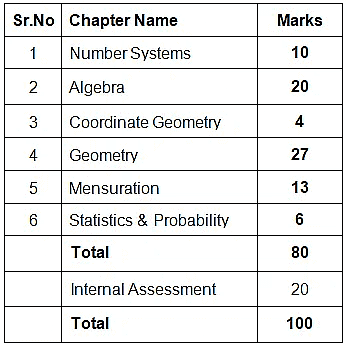CBSE Case Study Questions for Class 9 Maths - Pdf PDF Download
CBSE Case Study Questions for Class 9 Maths
CBSE Case Study Questions for Class 9 Maths are a type of assessment where students are given a real-world scenario or situation and they need to apply mathematical concepts to solve the problem. These types of questions help students to develop their problem-solving skills and apply their knowledge of mathematics to real-life situations.
Chapter Wise Case Based Questions for Class 9 Maths
The CBSE Class 9 Case Based Questions can be accessed from Chapetrwise Links provided below:
Chapter-wise case-based questions for Class 9 Maths are a set of questions based on specific chapters or topics covered in the maths textbook. These questions are designed to help students apply their understanding of mathematical concepts to real-world situations and events.
Chapter 1: Number System
Chapter 2: Polynomial
Chapter 3: Coordinate Geometry
Chapter 4: Linear Equations
Chapter 5: Introduction to Euclid’s Geometry
Chapter 6: Lines and Angles
Chapter 7: Triangles
Chapter 8: Quadrilaterals
Chapter 9: Areas of Parallelograms
Chapter 10: Circles
Chapter 11: Constructions
Chapter 12: Heron’s Formula
Chapter 13: Surface Areas and Volumes
Chapter 14: Statistics
Chapter 15: Probability
Weightage of Case Based Questions in Class 9 Maths

Why are Case Study Questions important in Maths Class 9?
Case study questions are important in Class 9 for several reasons:
- Enhance critical thinking: Case study questions require students to analyze a real-life scenario and think critically to identify the problem and come up with possible solutions. This enhances their critical thinking and problem-solving skills.
- Apply theoretical concepts: Case study questions allow students to apply theoretical concepts that they have learned in the classroom to real-life situations. This helps them to understand the practical application of the concepts and reinforces their learning.
- Develop decision-making skills: Case study questions challenge students to make decisions based on the information provided in the scenario. This helps them to develop their decision-making skills and learn how to make informed decisions.
- Improve communication skills: Case study questions often require students to present their findings and recommendations in written or oral form. This helps them to improve their communication skills and learn how to present their ideas effectively.
- Enhance teamwork skills: Case study questions can also be done in groups, which helps students to develop teamwork skills and learn how to work collaboratively to solve problems.
In summary, case study questions are important in Class 9 because they enhance critical thinking, apply theoretical concepts, develop decision-making skills, improve communication skills, and enhance teamwork skills. They provide a practical and engaging way for students to learn and apply their knowledge and skills to real-life situations.
Class 9 Maths Curriculum at Glance
The Class 9 Maths curriculum in India covers a wide range of topics and concepts. Here is a brief overview of the Maths curriculum at a glance:
- Number Systems: Students learn about the real number system, irrational numbers, rational numbers, decimal representation of rational numbers, and their properties.
- Algebra: The Algebra section includes topics such as polynomials, linear equations in two variables, quadratic equations, and their solutions.
- Coordinate Geometry: Students learn about the coordinate plane, distance formula, section formula, and slope of a line.
- Geometry: This section includes topics such as Euclid’s geometry, lines and angles, triangles, and circles.
- Trigonometry: Students learn about trigonometric ratios, trigonometric identities, and their applications.
- Mensuration: This section includes topics such as area, volume, surface area, and their applications.
- Statistics and Probability: Students learn about measures of central tendency, graphical representation of data, and probability.
The Class 9 Maths curriculum is designed to provide a strong foundation in mathematics and prepare students for higher education in the field. The curriculum is structured to develop critical thinking, problem-solving, and analytical skills, and to promote the application of mathematical concepts in real-life situations. The curriculum is also designed to help students prepare for competitive exams and develop a strong mathematical base for future academic and professional pursuits.
Students can also access Case Based Questions of all subjects of CBSE Class 9
- Case Based Questions for Class 9 Science
- Case Based Questions for Class 9 Social Science
- Case Based Questions for Class 9 English
- Case Based Questions for Class 9 Hindi
- Case Based Questions for Class 9 Sanskrit
Frequently Asked Questions (FAQs) on Case Based Questions for Class 9 Maths
What is Case-Based Questions?
Case-Based Questions (CBQs) are open-ended problem solving tasks that require students to draw upon their knowledge of Maths concepts and processes to solve a novel problem. CBQs are often used as formative or summative assessments, as they can provide insights into how students reason through and apply mathematical principles in real-world problems.
What are case-based questions in Maths?
Case-based questions in Maths are problem-solving tasks that require students to apply their mathematical knowledge and skills to real-world situations or scenarios.
What are some common types of case-based questions in class 9 Maths?
Common types of case-based questions in class 9 Maths include word problems, real-world scenarios, and mathematical modeling tasks.
FAQs on CBSE Case Study Questions for Class 9 Maths - Pdf
| 1. What are case study questions in CBSE Class 9 Maths? |  |
| 2. How are case study questions different from regular math questions in Class 9? |  |
| 3. Why are case study questions important in Class 9 Maths? |  |
| 4. How much weightage do case study questions have in the Class 9 Maths exam? |  |
| 5. Can you provide some tips to effectively answer case study questions in Class 9 Maths? |  |

|
Explore Courses for Class 9 exam
|

|


















